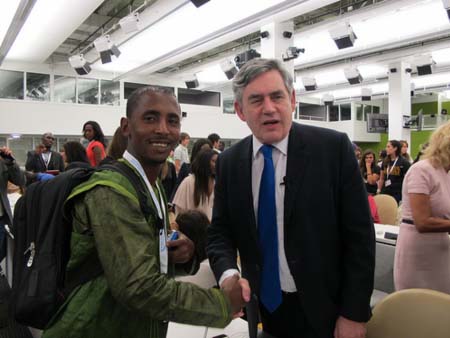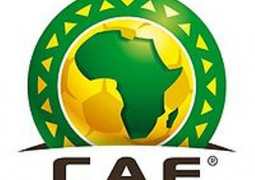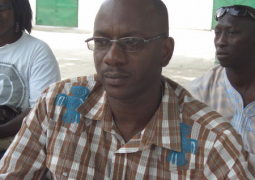
It was surreal to sit in the front row and listen to Malala speak. I was so touched when she said that she wanted education for the sons and the daughters of all extremists, especially the Taliban. Her statement will continue to motivate and inspire me, particularly whenever I recall her saying, “One child, one teacher, one pen and one book can change the world. Education is the only solution.”
This makes me reflect back on the situation back home in The Gambia and the status of girls’ education where there are many barriers that impede girls’ enrolment, retention and performance in school. Some of the factors responsible include: girls helping their parents on the farm and other trades, inability to afford the cost of schooling, household chores, parents not believing in formal education, and parents’ fear for the security of their girls.
Another highlight of the trip was when I met Mr. Gordon Brown (former Prime Minister of the United Kingdom) and Mr. Ban Ki Moon, UN Secretary General and listening to them talking to us, the young people of the World, to reaffirm the UN’s commitment to education and youth development globally. Mr. Gordon Brown’s statement was also moving and truly encouraging as he assured us that we (youth) are not alone in the advocacy for education for all particularly girls and that the UN is with is in the same movement. It was also inspirational to learn about Mr. Ban Ki Moon’s personal story and struggles in education and how he got to where he is today.
After the youth assembly, I participated in two skills building sessions, one on grassroots campaigning and the other on online organizing. I learnt new skills and ideas on social mobilization, use of social media, campaigning, advocacy and networking. These are critical elements towards any successful advocacy for girls’ education, especially for us in Africa. It enabled me to meet young people and other international education activists to share what we are doing in The Gambia and possible ways that we can work together.
I will work with the Forum for African Women Educationalists Gambia Chapter (FAWEGAM) school clubs in communities where girls are still denied their right to education, and advocate against forcing them into early marriage and domestic chores as these also affects their education. This will be done through sensitization, at both policy level to call for effective policy reforms and grass roots levels advocacy and campaign for attitudinal and behavioural change in favour of girls’ education. For us to accomplish these tasks, we would like to be supported by UNGEI’s technical team which is made up of individuals who share the same vision and belief that education as a basic human right.
We – the UNGEI youth delegates – agreed to be more instrumental towards education advocacy in our countries and beyond. We will share information and experiences of good practices in our countries with the youth community and UNGEI. I am once more committed to this cause and can say wholeheartedly that I will not sit back until quality education is totally free, safe and accessible for children, particularly girls, and that our leaders fulfill their commitments to education.



